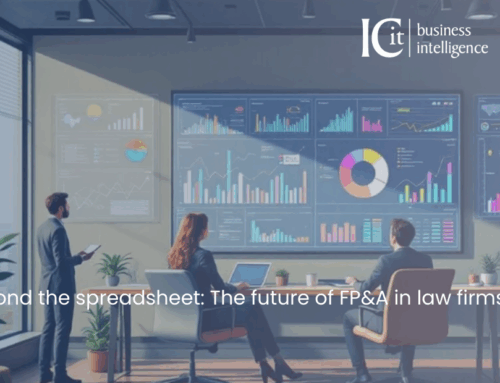As law firms expand globally and adopt new technologies, their finance teams are being asked to do more than balance the books. They must anticipate change, model new business realities, and help partners make faster, smarter decisions. In this article, ICit’s Mark Bodger explores how the future of Financial Planning and Analysis (FP&A) in law is being rewritten by data, collaboration, and intelligent planning platforms like Workday Adaptive Planning.
For decades, FP&A has quietly powered professional services, turning spreadsheets into strategy and data into direction. Yet the modern law firm looks very different from the traditional partnership model. With complex global structures, fluctuating demand and shifting pricing models, finance leaders must now deliver insight at speed and scale.
In law, FP&A isn’t just a back-office process; it’s the heartbeat of profitability. Every billable hour is a revenue unit, every practice area a dynamic business in its own right. When demand, resources or utilisation fall out of sync, the financial impact is immediate.
As the industry transforms finance can move from a function of control to a catalyst for growth.
From Control to Collaboration
A decade ago, financial planning in most firms was about control. Keeping data tidy, chasing inputs, and managing endless spreadsheets. Today, that mindset simply doesn’t scale.
Modern firms operate across jurisdictions, currencies, and service lines. To stay aligned, finance needs real-time data and connected planning tools that unite teams around a single version of the truth.
That’s why so many law firms are moving to cloud-based planning platforms like Workday Adaptive Planning, with ICit helping to design and implement them. By integrating financial and operational data, firms replace manual reporting with collaboration and foresight, creating a culture where finance empowers decision-makers instead of policing them.
Finance as a Strategic Partner
The most forward-thinking finance teams are no longer focused on what happened last quarter, they’re guiding where the business goes next.
Instead of reporting the past, FP&A now advises on pricing strategy, resourcing models and profitability in real time. Automation and system integration are freeing up teams from manual data reconciliation, allowing them to focus on value-add analysis.
With the right tools, finance can help partners understand why performance looks the way it does and what levers to pull to improve it.
Raising Data Literacy Across the Firm
Data literacy is fast becoming as important as financial literacy in law.
That shift requires both technology and education. Finance leaders are becoming teachers, helping practice heads and regional managers interpret trends, understand scenarios and make informed decisions.
The goal is a firm-wide culture of accountability, powered by accessible, insightful reporting.
Scaling Growth Without Adding Complexity
Expansion across borders brings complexity: multiple entities, currencies, tax regimes, and billing models. Without standardisation, visibility is quickly lost.
Modern planning systems solve this by consolidating core data into a single platform that supports both global control and local flexibility. Multi-entity, multi-currency frameworks within Workday Adaptive Planning allow firms to grow without losing grip on performance. This reduces manual effort, improves accuracy and ensures consistent reporting across regions.
AI, Pricing, and the Future Workforce
Artificial intelligence is reshaping how legal services are delivered and how they’re valued.
As automation reduces manual workloads, finance teams must rethink staffing models and pricing structures. Fewer junior lawyers and more data analysts are changing the cost base; value-based and subscription models are replacing the traditional hourly rate.
The best FP&A teams are already modelling these shifts and exploring how automation affects profitability, partner rewards, and client expectations. Scenario planning has become essential to staying ahead.
The Road Ahead: FP&A in 2026 and Beyond
Three forces are redefining finance in the legal sector:
- Connected data ecosystems – Uniting finance, HR and case-management data for a single, real-time performance view.
- Predictive analytics – Using AI-driven forecasting to anticipate demand and profitability.
- ESG reporting – Expanding FP&A’s remit to include sustainability and social impact metrics.
Finance is more than a reporting function. Today it can be a driver of strategy, innovation, and cultural change.
The Connected Firm Advantage
The law firms that succeed over the next decade will be those that combine the precision of finance with the agility of technology. By embracing connected planning, firms can replace manual reporting with insight, forecast with confidence and scale sustainably.
The future of FP&A is smarter, faster, data-driven decisions.
Ready to modernise your firm’s FP&A?
ICit helps law firms and professional services organisations transform their planning, budgeting, and reporting with Workday Adaptive Planning. To find out how we can help you build a connected planning environment that scales with your firm, get in touch with our team today. To learn more about our FP&A Solutions in Law Firms and Legal Services
In person events and live webinars
We hold a range of in person events and live webinars, where we share our planning insights and expertise and demonstrate our partners’ solutions. Take a look at the schedule, see what’s coming up and register to attend an event. See Events








